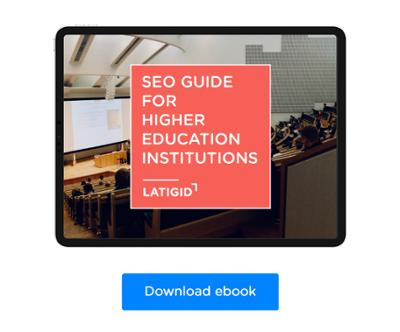
Traditional marketing strategies alone are no longer sufficient for higher education institutions to attract and engage prospective students. The rise of the internet and social media has transformed the way individuals seek and consume information, making it imperative for colleges and universities to adapt their marketing efforts to meet the evolving needs of students. This is where inbound marketing comes into play.
In this blog article, we will delve into the world of inbound marketing for higher education, exploring how this student-centric approach can revolutionize the way institutions attract, engage, and convert prospective students. So, whether you are a marketing professional, an admissions officer, or an educational institution looking to enhance your recruitment efforts, read on to discover how inbound marketing can propel your institution to new heights in the student-centric era.
What is inbound marketing and why is it a student-centered approach?
Inbound marketing is a student-centered approach that focuses on attracting, engaging, and nurturing prospective students through valuable content, personalized experiences, and building strong relationships. Unlike traditional marketing, which often relies on interruptive tactics like cold calling or generic advertising, inbound marketing seeks to align with the needs and preferences of students in order to create a more meaningful and mutually beneficial connection.
One of the core principles of inbound marketing is creating valuable content that addresses the specific interests and challenges of prospective students. This content can take various forms, such as blog articles, videos, ebooks, or webinars, and is designed to educate, inspire, and guide students throughout their decision-making process. By offering helpful and relevant information, higher education institutions establish themselves as trusted resources and position themselves as experts in their respective fields.
Inbound marketing also prioritizes personalized experiences. Instead of using a one-size-fits-all approach, institutions strive to understand the unique characteristics, goals, and aspirations of individual students. By leveraging data and technology, institutions can deliver personalized messages, recommendations, and offers that resonate with students on a personal level. This level of customization not only enhances the student experience but also increases the likelihood of students engaging with the institution and ultimately enrolling.
Furthermore, inbound marketing places a strong emphasis on building relationships. It recognizes that the decision to pursue higher education is a significant and often emotional one for students. By fostering genuine connections and engaging in meaningful conversations, institutions can establish trust and rapport with prospective students. This involves actively listening to student concerns, providing timely support and guidance, and maintaining ongoing communication even after enrollment. Building relationships based on empathy and understanding helps institutions create a positive brand image and turn students into enthusiastic advocates.
Related article: Inbound Marketing for Higher Education: Student Retention Tips
Why should inbound marketing be a higher education institution's approach?
Inbound marketing has emerged as a powerful tool that aligns with the changing behaviors and expectations of today's students. By focusing on creating valuable content, building relationships, and delivering personalized experiences, inbound marketing enables universities to connect with prospective students on a deeper level, ultimately influencing their decision-making process. Inbound marketing should be universities' approach for several compelling reasons:
Changing Student Behavior
The behavior of prospective students has shifted dramatically in the digital age. They are actively seeking information, researching institutions, and making decisions online. Inbound marketing aligns with this behavior by providing valuable content that meets students where they are, attracting them organically through search engines, social media, and other digital channels.
Cost-Effectiveness
Inbound marketing offers a cost-effective alternative to traditional marketing methods. By focusing on creating and promoting valuable content, universities can reach a wider audience without relying heavily on expensive advertising campaigns. Inbound marketing allows institutions to maximize their marketing budgets while generating high-quality leads.
Relationship Building
Inbound marketing emphasizes building long-term relationships with prospective students. By consistently delivering valuable content and personalized experiences, universities can establish trust, credibility, and loyalty with their audience. This relationship-based approach fosters stronger connections, increases brand affinity, and encourages word-of-mouth referrals, all of which contribute to the overall success of the institution.
Targeted Engagement
Inbound marketing enables universities to target specific segments of prospective students more effectively. Through data analysis and segmentation, institutions can tailor their content and messaging to resonate with different audience segments, such as high school students, transfer students, or international students. This targeted engagement helps universities deliver relevant information and address the unique needs and aspirations of different student groups.
Measurable Results
Inbound marketing allows universities to track and measure the impact of their marketing efforts more accurately. By utilizing analytics and tracking tools, institutions can monitor website traffic, conversion rates, engagement metrics, and other key performance indicators. This data-driven approach provides valuable insights into the effectiveness of marketing campaigns and enables universities to optimize their strategies for better results.
Long-Term Sustainability
Inbound marketing focuses on creating evergreen content that continues to generate value over time. Unlike traditional marketing methods that may have short-lived effects, inbound marketing assets, such as blog articles, videos, or ebooks, can attract and engage students indefinitely. This long-term sustainability allows universities to build a robust online presence, establish thought leadership, and continuously attract new prospects.
In summary, inbound marketing should be universities' approach because it aligns with changing student behavior, offers cost-effective strategies, prioritizes relationship building, enables targeted engagement, provides measurable results, and ensures long-term sustainability. By adopting an inbound marketing approach, universities can effectively adapt to the digital landscape, engage with prospective students in meaningful ways, and achieve their enrollment and recruitment goals.
Related article: Inbound Marketing for Universities: How to Attract New Students
About LATIGID
We are a Higher Education Marketing Agency, specialized in Inbound Marketing. We help you grow by increasing website traffic, generating more student leads and closing those leads into enrollment. With a deep understanding of the latest industry trends and best practices, we are well equipped to help your institution grow.
If you are looking for a Higher Education Marketing Agency to partner with, check our page to see what we can do for you!
Download our SEO guide and learn how to build a strategy to optimize your Higher Education Institution's website




